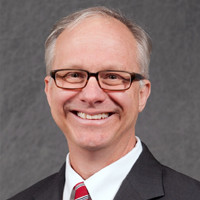A Q & A With The President Of Florida’s Newest University
This coming Saturday marks the grand opening for Florida’s 12th state university. Florida Polytechnic University, in Polk County, will offer a tuition-free education focused on science, technology, engineering and math — STEM — to its inaugural class of about 550 students. They start on August 25th.
President Randy Avent sat down with Robin Sussingham from WUSF in Tampa to talk about his vision for the new university.
Q: This is not a Silicon Valley, this is not a Research Triangle, this is a rural Polk County location. So how is that going to affect this university? How’s it going to affect your job? Is it going to make recruiting more difficult? Tell me about how this fits in?
A: It will make recruiting more difficult, but it’s an opportunity. We like to use this a catalyst to really develop that [Interstate]-4 corridor, high-tech corridor that everyone talks about. You know, we’re geographically located halfway between Tampa and [the University of South Florida] and Orlando and [the University of Central Florida] – both of them great institutions. And so the question is how can we bridge the gap between those two institutions and help create that mission and create that corridor
Q: I read an article about you recently and he said “Dr. Avent sees the future of university research as less curiosity-driven and more focused on solving real-world problems.” Tell me what that means?
A: Traditional university research is generally basic and early applied research. And that kind of falls into two categories; one that’s curiosity-driven. For instance, Niels Bohr, when he studied the atom, there was no problem that he was trying to solve. He was just trying to fundamentally understand the atom, and what made the atom.
That was in contrast to Pasteur. So when Pasteur studied microbiology he was trying to understand the fundamental processes behind pasteurization and microbiology. But he had a problem in mind, which was to make milk products safer.
Lasers, the person that invented lasers wasn’t trying to solve any problem, they were just interested in coherent light…
Q: Well, that’s what I was going to say. A lot of times just basic research leads to things you can’t foresee.
A: Exactly, it’s a, that curiosity-driven basic research is a high risk, high payoff. And so what we’re trying to do here is build stronger interactions with industry and go off and solve some of their problems so that we get some steady returns and some steady job growth out of that.
Q: You’ve been at [Massachusetts Institute of Technology]. You’ve been at N.C. State. You’ve been at [University of North Carolina]. You’ve been at schools with a long history and a deep culture. So, what are you trying to build here? What will people say about Florida Poly 20 years from now?
A: I’m trying to actually take the M.I.T. culture and bring it here. And that’s not to say that we’re going to compete anytime soon with M.I.T.

Florida Polytechnic University
President Randy Avent is preparing to open Florida Polytechnic University near Lakeland.
M.I.T. was set up in direct opposition to Harvard. Harvard was a very liberal arts school, where students went and they studied Greek, they studied Latin and those types of topics.
When M.I.T. started it was in direct opposition. It really started off as a college for blue-collar workers; for people that were machinists, for people that were engineers.
It’s a hands-on university. They’re actually expected to go out and to start companies and to license technology. It’s a part of their culture.
And that’s the same thing that we’re trying to create here, is that we’re rewarding faculty for getting out; for being proactive; working with industry; trying to create new things; trying to license stuff they do.
Q: So tell me what’s the typical Florida Polytech student going to be like?
A: Strong in math and science. I think someone that has a genuine curiosity about things. Someone that likes being hands-on. But also, someone that’s very good in the fundamentals.

